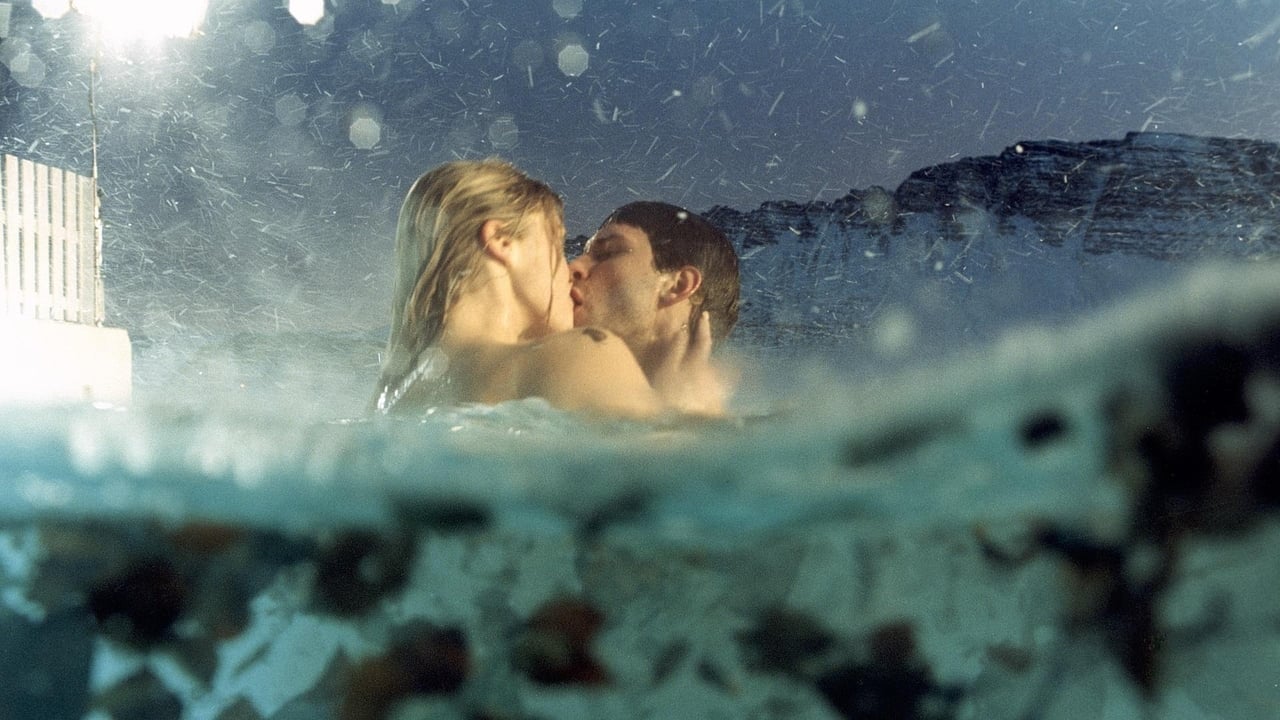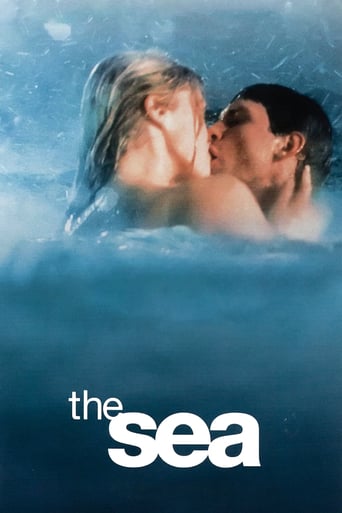

Balthasar Kormalkur's family drama begins with two disturbing images of violence tinted with green and sick yellow hues: one of a man climbing out of the wreck of his vehicle, weeping, and another young man, seen only from his back, pouring gasoline onto the floor of some building. Both follow each other almost simultaneously, as if they were happening at the same time, and intuition indicates that this is exactly what is happening. This, of course, over the plain white credits over a black background as a sad tune plays, is the beginning of THE SEA.Somehow Iceland doesn't conjure up images of domestic violence and family dysfunction. Being so close to Ingmar Bergman's own Sweden, one gets images of slow moving stories dripping with subtext told in ways that allows for multiple interpretations. However, this is a story about a patriarch, Thordur, who has an announcement to make to his sons who all live far away from home. Agust is the youngest and the father's favorite son, and has escaped Iceland and adopted France as his country, living with his girlfriend Francoise, and who has recently quit school and spent his father's money in order to make a career out of himself in the music business. Haraldur, the older son, manages the family business while his wife Aslaug wallows in a little fashion store called Cosmopolitan and goes over the top in desperation because she wants more. The eldest sister, Ragnheidur (Rags, for short -- these names are rather complicated) is as bitter as citric acid, has a yuppie husband and teenage son.Like all family dramas, this one has the requisite secrets, jealousies, longings, and machinations that has made the best of stories (King Lear, The Little Foxes). There is little love in this family. Too many unresolved issues run amok, and it's only time before they explode in acts of rage that threaten to destroy what little unity remains. At least Kormalkur has interspersed the movie with moments of very mordant humor, one of the funniest involving Aslaug as she goes from explosion to explosion, growling like a cat in heat, so needy for a way out it's a miracle she just doesn't brain her husband's head and escape, alone, into her future. The actress playing her looks a little like Marcia Cross from "Desperate Housewives", but Aslaug is no Bree: quite the contrary, she's a veritable shrew, out for what she believes is hers.Much of the movie's momentum is focused on these three siblings converging in their home in Iceland, then their interaction with one another as they study each other like hawks or hyenas ready to devour the carcass, and the definite high gear the story goes into once Thordur reveals his announcement, which is not a pretty thing. From then on, it's a grim fight for filial supremacy that clearly won't end well. Like in "King Lear", the older siblings, monsters like Regan and Goneril, conspire to commit the father to a mental institution. However, it's the movie's Cordelia, the alienated Agust, who takes matters into his own hands and settles things in a way that can only be considered satisfying for all.So without a real hero, who can we hold onto? Answer is, no one: this is a family of siblings that are out for what they believe to be theirs. That their motives are diametrically opposed is part of the issue; Agust could be seen as the purest while the older ones could be interchangeable -- Rags being the more money hungry and Haraldur being plain practical -- and its execution is pretty sharp within its transitions from scene to scene. What may work against it is that this is one of the oldest stories in the world, and one can almost guess what is going to happen next even without the subtitles, because really: how difficult is it to retain a sense of suspense in a family drama?
... View MoreIceland always seemed to me to be the place of exotic mystery. The lonely island in the middle of Atlantic ocean. This movie was little more realistic than my assumptions. The story is old and seen many times before - father and children on two completely opposite sides. The battle between tradition and progress , between lifelong dreams and reality. Mr.Kormakur sets his movie on the harsh and beautiful landscape making the nature an active participant. All in all it is a well done film, with strong acting, but with one significant shortcoming. All the characters are so despicable that is hard to take any of it seriously. And than maybe that was the intention.
... View MoreReasonably well acted and written, and it had what I went to it for, namely Iceland, but otherwise it was the same old dysfunctional family melodrama I've seen 500 times before. It was occasionally interesting to note parallels to the old sagas - Icelandic writers seem to be constitutionally incapable of not referring to them, but I guess if you have a living 1000 year old literary tradition, you might as well use it. If it was set in New York, I wouldn't have wasted my time on it though. If you've seen a lot of movies, you'll probably be thinking things like "not the freaking dinner-table meltdown scene again" as you watch it go through all the standard dysfunctional-family plot devices.
... View MoreWhen I saw this film for the first and last time, I found it to be one of the worst films that I've seen from Scandinavia. Of course I am not saying that this is THE WORST movie to be exported from our Nordic cousins, but because I found it to be so pretentious. Every single one of the cast members were trying to pronounce Icelandic as clearly as they could and they felt that every single facial expression had to be expressed to the fullest. Hence, leaving the performance to be flat and flamboyant.Not to mention that director Baltasar Kormákur is a total egotist and apparently he was more conscious of letting everyone know that he directed this instead of actually directing this film (his credit appears 3 times as the director).However this film does project a dark image over rural-Iceland and it examines the Icelandic fishing industry as the same source of corruption as the family as both suffered and witnessed. This MELODRAMA tries to fit into the footsteps of the Danish film "Festen" but fails because you feel like you are watching a knock off of the Danish masterpiece. Kormákur generalizes the Icelandic family and portrays it as grimm trolls lurking from the mountains in the dark.May I suggest to Icelandic filmmakers and actors to act like you are not acting and that directors should at least make an effort to direct instead of telling everyone that he is directing it.The only one who deserves any praise in this movie is Film editor Valdís Óskarsdóttir, who coincidently edited Festem and must of felt just like home during the making of this excuse of a movie.
... View More